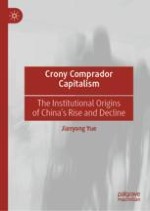2024 | OriginalPaper | Buchkapitel
3. The Institutionalization of Crony Capitalism in Market Leninism (1990s–2002)
verfasst von : Jianyong Yue
Erschienen in: Crony Comprador Capitalism
Verlag: Springer Nature Switzerland
Aktivieren Sie unsere intelligente Suche, um passende Fachinhalte oder Patente zu finden.
Wählen Sie Textabschnitte aus um mit Künstlicher Intelligenz passenden Patente zu finden. powered by
Markieren Sie Textabschnitte, um KI-gestützt weitere passende Inhalte zu finden. powered by
